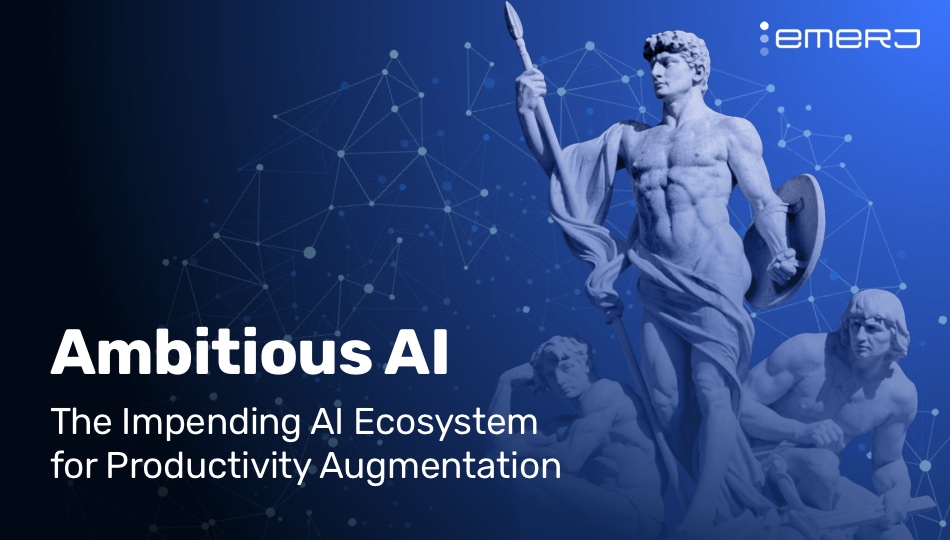In 2010, most Americans would struggle to list the ways in which AI impacts their day-to-day life.
In 2022, many of us spend large percentages of our daily life using AI applications. They guide our route to the office, they automatically edit our photos, they find obscure products or facts, and – mostly – they entertain or distract us.
Copyright: emerj.com – “Ambitious AI – The Impending AI Ecosystem for Productivity Augmentation”
 Not only has our screen time increased over the last twelve years, our “percent of screen time generated by AI” has gone up astronomically.
Not only has our screen time increased over the last twelve years, our “percent of screen time generated by AI” has gone up astronomically.
The most prominent of the AI interfaces we interact with today are optimized at keeping us “engaged” – maximizing for the goal of the platform itself: Revenue (through purchases, maintained subscriptions, and/or advertising).
In this article I’ll lay out a case as to why and how AI will invariably expand into a necessary addition for nearly all productive work, and how the proliferation of this trend might lead to more serious cognitive augmentation and transhumanism.
I’ve broken this article down into the following sections:
- Defining Terms – “Distractive” and “Ambitious” AI
- Why Entertainment and Passive AI Came First
- From the Goals of the Platform – to the Goals of the User
- AI Augmentation – From Web Apps to Brain Computer-Interface
This article is less a collection of my own ideas, and more a collection of “connected dots” from the many brilliant minds we’ve connected with at Emerj Artificial Intelligence Research. From academics, to startup founders, to United Nations leaders – I’m grateful to all of the friends and folks in our expert network for contributing quotes, ideas, and articles worth referencing to in this work.
Thank you for reading this post, don't forget to subscribe to our AI NAVIGATOR!
Note: This won’t be an essay assailing the founders of current AI-augmented media platforms for being malicious or detrimental to mental health. Rather, I’ll be examining trends and incentives, not the moral character of individuals.
TLDR Summary
- Entertainment-oriented consumer AI applications (Distractive AI, appealing to the drive for pleasure) have dominated the first wave of AI-powered consumer apps mostly because of the fact that they can optimize for the same goals (engagement) across all users.
- Soon, an ecosystem of AI-enabled applications (Ambitious AI, appealing to the drives for power and profit) will emerge in the decade ahead, though these applications will need to overcome the technical challenges of being trained on more bespoke/varied goals than many Distractive use-cases.
- Most people will likely live in a combination of Distractive and Ambitious interfaces for most of their waking hours.
- Some people will choose (lotus eaters)
- Some people will asdf asdf (world eaters) […]
Read more: www.emerj.com


In 2010, most Americans would struggle to list the ways in which AI impacts their day-to-day life.
In 2022, many of us spend large percentages of our daily life using AI applications. They guide our route to the office, they automatically edit our photos, they find obscure products or facts, and – mostly – they entertain or distract us.
Copyright: emerj.com – “Ambitious AI – The Impending AI Ecosystem for Productivity Augmentation”
The most prominent of the AI interfaces we interact with today are optimized at keeping us “engaged” – maximizing for the goal of the platform itself: Revenue (through purchases, maintained subscriptions, and/or advertising).
In this article I’ll lay out a case as to why and how AI will invariably expand into a necessary addition for nearly all productive work, and how the proliferation of this trend might lead to more serious cognitive augmentation and transhumanism.
I’ve broken this article down into the following sections:
This article is less a collection of my own ideas, and more a collection of “connected dots” from the many brilliant minds we’ve connected with at Emerj Artificial Intelligence Research. From academics, to startup founders, to United Nations leaders – I’m grateful to all of the friends and folks in our expert network for contributing quotes, ideas, and articles worth referencing to in this work.
Thank you for reading this post, don't forget to subscribe to our AI NAVIGATOR!
Note: This won’t be an essay assailing the founders of current AI-augmented media platforms for being malicious or detrimental to mental health. Rather, I’ll be examining trends and incentives, not the moral character of individuals.
TLDR Summary
Read more: www.emerj.com
Share this: